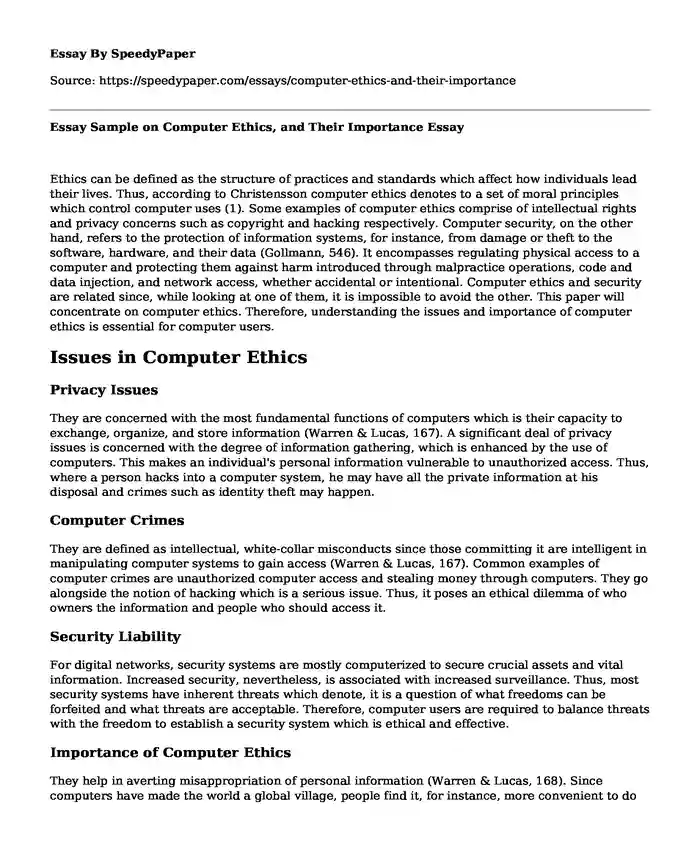
| Type of paper: | Essay |
| Categories: | Information technologies Cyber security Ethical dilemma Social issue |
| Pages: | 3 |
| Wordcount: | 713 words |
Ethics can be defined as the structure of practices and standards which affect how individuals lead their lives. Thus, according to Christensson computer ethics denotes to a set of moral principles which control computer uses (1). Some examples of computer ethics comprise of intellectual rights and privacy concerns such as copyright and hacking respectively. Computer security, on the other hand, refers to the protection of information systems, for instance, from damage or theft to the software, hardware, and their data (Gollmann, 546). It encompasses regulating physical access to a computer and protecting them against harm introduced through malpractice operations, code and data injection, and network access, whether accidental or intentional. Computer ethics and security are related since, while looking at one of them, it is impossible to avoid the other. This paper will concentrate on computer ethics. Therefore, understanding the issues and importance of computer ethics is essential for computer users.
Issues in Computer Ethics
Privacy Issues
They are concerned with the most fundamental functions of computers which is their capacity to exchange, organize, and store information (Warren & Lucas, 167). A significant deal of privacy issues is concerned with the degree of information gathering, which is enhanced by the use of computers. This makes an individual's personal information vulnerable to unauthorized access. Thus, where a person hacks into a computer system, he may have all the private information at his disposal and crimes such as identity theft may happen.
Computer Crimes
They are defined as intellectual, white-collar misconducts since those committing it are intelligent in manipulating computer systems to gain access (Warren & Lucas, 167). Common examples of computer crimes are unauthorized computer access and stealing money through computers. They go alongside the notion of hacking which is a serious issue. Thus, it poses an ethical dilemma of who owners the information and people who should access it.
Security Liability
For digital networks, security systems are mostly computerized to secure crucial assets and vital information. Increased security, nevertheless, is associated with increased surveillance. Thus, most security systems have inherent threats which denote, it is a question of what freedoms can be forfeited and what threats are acceptable. Therefore, computer users are required to balance threats with the freedom to establish a security system which is ethical and effective.
Importance of Computer Ethics
They help in averting misappropriation of personal information (Warren & Lucas, 168). Since computers have made the world a global village, people find it, for instance, more convenient to do their shopping online where they are asked to fill their personal information. In case it is stipulated in the sellers' privacy policies that sellers adhere to computer ethics and cyber laws, this discourages misuse of buyers' personal information since such actions, for the sellers, are punishable by the law.
Computer ethics also helps avert intellectual property theft. Internet and computers contain different forms of intellectual properties such as research studies and songs. In the absence of computer ethics, such works may be easily be plagiarized or copied by other individuals without their owner consent (Warren & Lucas, 168). Thus, computer ethics guide on the use of other people's work with their consent or knowledge.
Computer ethics also help people from being unethical. People are not required to adhere to computer ethics to show other individuals that they are ethical. Nevertheless, by adhering to computer ethics, they learn what they are required to do so primarily to be responsible computer users. Thus, this helps them avoid finding themselves in dangers of being unethical.
Conclusion
Computer ethics is a major subject associated with different issues and importance in the current world. Some of these issues include privacy issues, computer crimes, and security liability, which in most cases, introduce ethical consideration of what is right or wrong and acceptable or unacceptable. Computer ethics, however, are important since they help in averting misappropriation of personal information, intellectual property theft, and aids people from being unethical. Thus, when computer ethics are extensively followed, they may introduce more significant benefits than issues.
Works Cited
Christensson, Per. "Computer Ethics Definition." TechTerms. Sharpened Productions, 2006. Web. 09 September 2019. <https://techterms.com/definition/computerethics>.
Gollmann, Dieter. "Computer security." Wiley Interdisciplinary Reviews: Computational Statistics 2.5 (2010): 544-554.
Warren, Matthew, and Richard Lucas. "Ethics and ICT: Why all the fuss?" Journal of Information, Communication and Ethics in Society 14.2 (2016): 167-169.
Cite this page
Essay Sample on Computer Ethics, and Their Importance. (2023, Feb 14). Retrieved from https://speedypaper.net/essays/computer-ethics-and-their-importance
Request Removal
If you are the original author of this essay and no longer wish to have it published on the SpeedyPaper website, please click below to request its removal:
- Pig Production Essay Sample
- Essay Sample on the Topics of Socialization and the Impact of the Media on a Child's Behavior
- Free Essay on How Determinate Sentencing Fails to Accomplish Equality of Punishment
- Essay Example on Freedom of Navigation
- Essay Example on Service Encounters
- Free Essay Example. Event Planner Interview
- Essay Sample on Exploring Emerging Networking Technologies: A Comprehensive Overview
Popular categories




